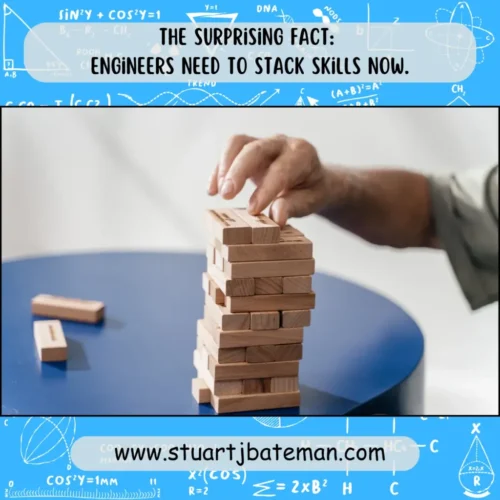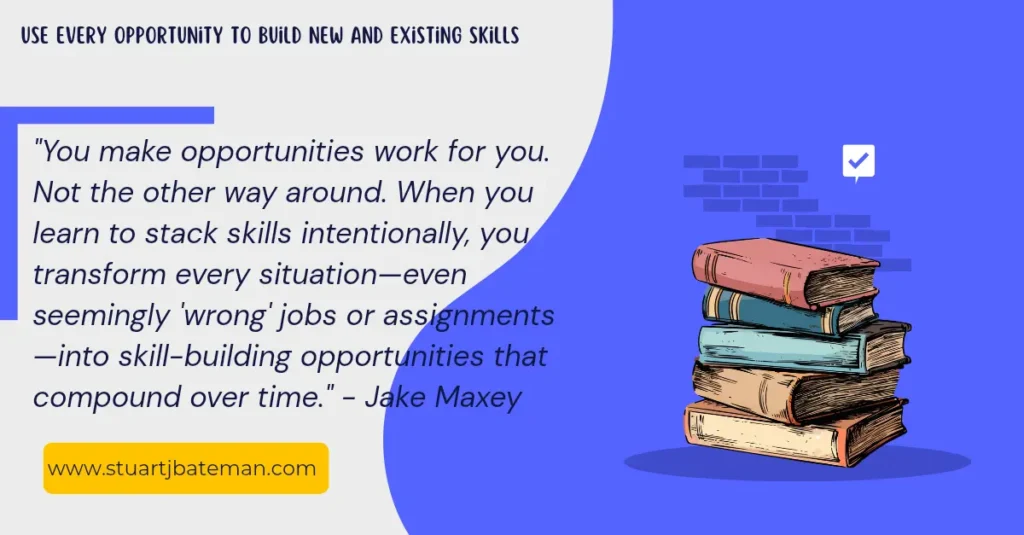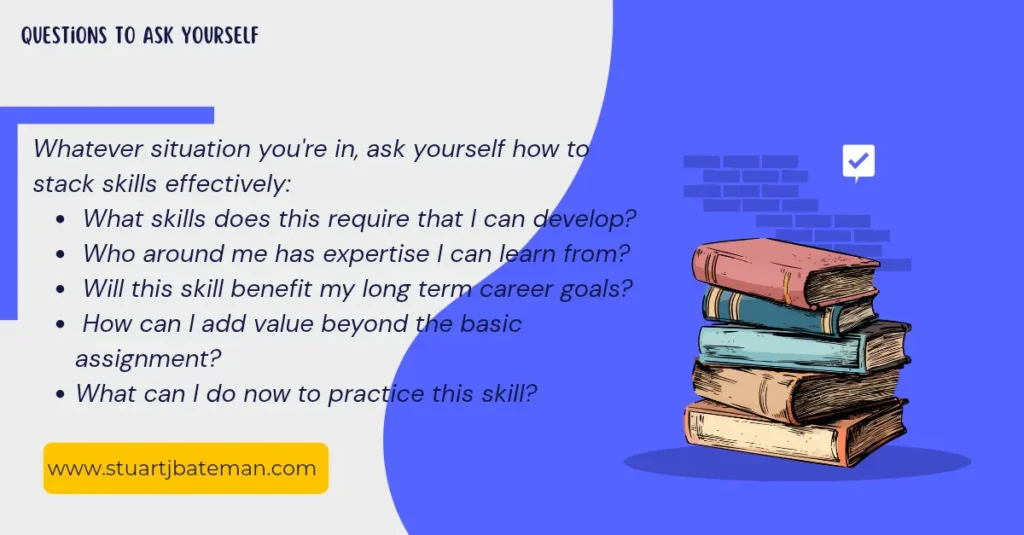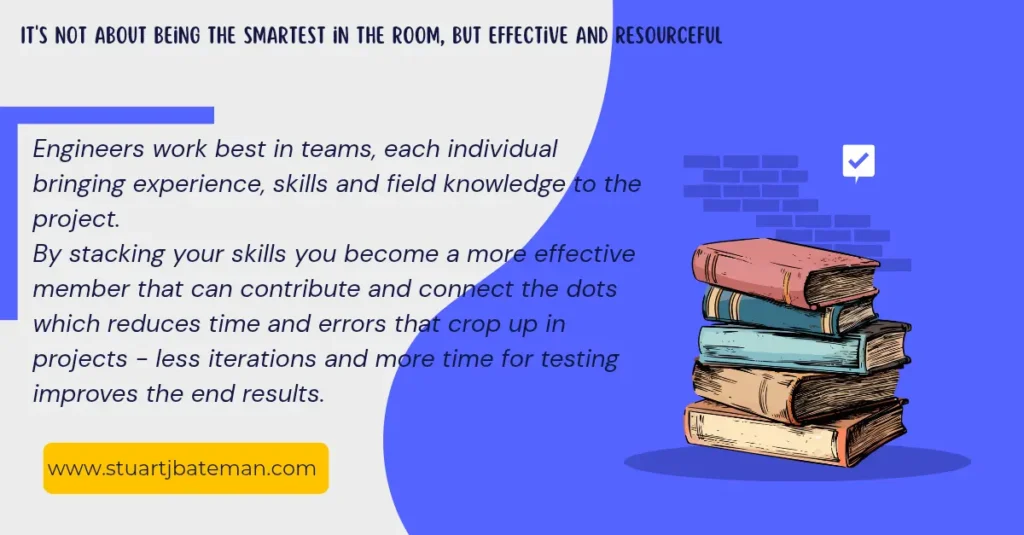The surprising fact: Engineers need to stack skills now.

Learning how to learn is life’s most important skill.
Tony Buzan
Stack Skills for Maximum Career Impact
“Simply stack skills and work on your personal development,”
advises Jake Maxey, an MEP electrical engineer.
“You make opportunities work for you. Not the other way around. When you learn to stack skills intentionally, you transform every situation—even seemingly ‘wrong’ jobs or assignments—into skill-building opportunities that compound over time.”

Senior Engineer Perspective
You can either create the narrative that you landed in the wrong place, are being given the wrong work, have bad coworkers or a bad boss… Or, you can get curious and learn from those around you, take the assignments given and learn to do them better than anybody else, ask for the right work, get to know your co-workers on a deep level, take responsibility for what you can control, and learn every day with intent and energy.
This mindset transforms every situation into opportunities to stack skills systematically.
What You Can Do Now
Strategic skill stacking means intentionally building complementary capabilities that multiply your value over time. When you stack skills effectively, you create compound career growth that accelerates advancement opportunities.
The Skills Audit Framework
Create three categories to organize how you stack skills:
- Core Technical: Fundamental engineering skills for your discipline
- Adjacent Technical: Related engineering skills that expand your versatility
- Universal Professional: Skills valuable across all engineering roles
Current Skills Inventory Exercise
List your abilities in each category with proficiency levels to understand where to stack skills next:
- Beginner: Basic understanding, need guidance
- Intermediate: Can work independently, still learning nuances
- Advanced: Can teach others, solve complex problems
- Expert: Sought out by others for guidance

Opportunity-Based Skill Development
Whatever situation you’re in, ask yourself how to stack skills effectively:
- What skills does this require that I can develop?
- Who around me has expertise I can learn from?
- What aspects of this work could I do better than anyone else?
- How can I add value beyond the basic assignment?
The “Adjacent Learning” Strategy
When you stack skills through adjacent learning, you multiply your value. When assigned work in Area A, also learn:
- The upstream process that feeds into Area A
- The downstream process that uses Area A’s output
- How Area A connects to other systems
- What happens when Area A fails
- How to improve Area A’s efficiency
Skill Stacking Examples for Students
Learn to stack skills through these practical combinations:
- Coursework + Programming: Use coding to solve engineering problems more efficiently
- Lab Work + Documentation: Develop technical writing skills alongside experimental skills
- Group Projects + Leadership: Practice project management and team coordination
- Research + Communication: Learn to present complex findings clearly
The Compound Effect Planning
Map how you can stack skills for maximum impact:
- Technical Skill + Communication = Ability to lead technical teams
- Engineering + Business Understanding = Product management capability
- Problem-Solving + Programming = Automation and optimization expertise
- Design + Manufacturing Knowledge = Design for manufacturability expertise
Building Your Learning Network
Identify resources that help you stack skills systematically:
- Internal mentors: People in your organization with desired skills
- External mentors: Industry professionals in your target areas
- Peer learning: Classmates or colleagues developing complementary skills
- Formal resources: Courses, certifications, workshops
- Project opportunities: Ways to practice new skills in real contexts
What the Pros Say About Skill Stacking
Jake Maxey emphasizes the long-term perspective when you stack skills:
“Stack skills wherever you are at the time, and you will lead yourself to your ideal job/career. You can always get another job or even switch careers in the future, so don’t worry about the one you have so early on in your career. You can always take your skills with you, and they will be what serves you going forward.”
Bug Meehan exemplifies strategic skill combination:
“Successful product designers combine strong technical skills with the creative aspects of design. In my case, I’ve always had both technical and creative passions, which I credit for much of my success. However, I’ve also focused on continual learning and growth throughout my career.”
Jeff Perry’s career transformation illustrates how you can stack skills for career pivots:
“Beyond the technical things I was working on I recognized that I really cared about building people, but I didn’t know how to take my career in that direction… I had one in particular who was the VP of engineering that encouraged me to take on a side project to do training internal to the organization on culture and mindsets. That was a perfect fit for me, and unlocked a great love to work on the people issues.”

Why Learning to Stack Skills Matters Later
Strategic skill stacking creates career optionality and advancement opportunities:
- Leadership Preparation: Engineers who stack skills by developing technical expertise plus communication, project management, and team-building skills naturally progress into leadership roles.
- Career Pivot Capability: When you stack skills diversely, you enable transitions between industries, roles, or specializations without starting over.
- Innovation Leadership: Complex technical challenges require multidisciplinary approaches. Engineers who stack skills across complementary areas lead breakthrough projects.
- Entrepreneurial Readiness: Starting a business or consulting practice requires technical depth plus business skills. Learning to stack skills in sales, marketing, and financial management alongside technical expertise creates entrepreneurial opportunities.
- Future-Proofing: As technology evolves, engineers who stack skills across multiple areas adapt faster than those with narrow specialization.
- Premium Value Creation: The intersection of multiple skills often creates the highest value roles. When you stack skills strategically, you qualify for technical sales, product management, systems engineering, and technical leadership positions that reward skill diversity.
The intentional skill development you practice now becomes the foundation for career advancement, industry transitions, and leadership opportunities throughout your professional life.
Your Next Step to Stack Skills
Complete your skills audit this week. Then identify one “adjacent skill” you could develop through your current situation. Examples of how to stack skills practically:
- If doing coursework, add programming to automate calculations
- If in a group project, volunteer to lead project management
- If doing research, practice presenting findings to non-technical audiences
- If working part-time, learn about the business aspects of your employer
Choose one specific skill to develop over the next month. Find a mentor, resource, or project opportunity that lets you practice this skill while fulfilling your current responsibilities.
Share Your Experience
What skill combinations do you think would be most valuable in your engineering discipline? Have you found ways to stack skills simultaneously through your current activities? What adjacent skills are you most interested in adding to your toolkit?
Resource – (Internal) – Personal Development
Below are links to my 5 part series on Personal development:
- Making mistakes / assumptions and being wrong
- Can you detect Baloney
- First principles thinking
- Do you think it’s better to win?
- The Socratic method – Critical thinking



What are your thoughts? Have I covered everything or is there more you know and would like to share?
I’m always learning and improving this site and my blogs, so please feel free to get in touch with me via LinkedIn or this site to discuss any topics I have covered.
If you’re having trouble finding ways to progress check out these sites filled with free learning tools:


Discover more from The Chartered Engineer
Subscribe to get the latest posts sent to your email.